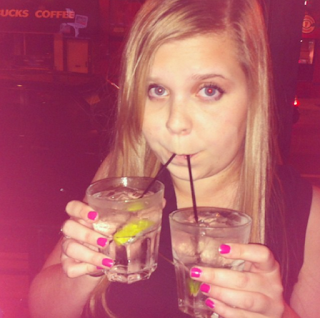I love to read. Always have. When I was little, this meant some friendly teasing about the irony my last name from some kids who were too young to understand irony. As an adult, it’s meant an English degree and a shelf full of “to-reads” I can never quite catch up to before buying even more.
It always baffled me, in fact, that there were people out there who didn’t like to read. What was there to not like about picking up a book and being somewhere else for an hour? Whether it was escaping my own problems through someone else’s or feeling understood, there was nothing like a book.
As an adult, it’s gotten a little harder to find time to read for fun. In college I was constantly reading because I was an English major–– it’s kind of part of the territory–– but now as someone with a full time job, my books to-read were gathering dust on the shelf. I was hitting up the easy reads like memoirs, and doing so at a snail’s pace. And I didn’t feel like myself because of it.
 |
| Some favorite Christmas gift selections |
Fast forward to early February–– I got sick, really sick, and fast. I went from dancing my face off on my 24th birthday to fainting from pain in the backseat Uber on my way home from work in 2 days flat. Since then, I’ve been in a pretty aggressive flare that has knocked my body (and more importantly, my social life) on its ass. These days, I don’t happy hour–– I try to stay awake through a work day and then have a happy hour with me, my couch, and no fewer than two heating pads.
So that all sounds no fun, right? Except I’ve been conditioned to be ever the optimist, so I was recently thinking about the good things this flare has brought me. I eat healthier. I prioritize my health more. I actually communicate with my doctors. I keep my mental health in check better than ever before. And most fun of all? I’m reading again.
Reading is a phenomenal hobby for anyone with chronic illness. It’s cheap (hey, libraries), it’s easy, and it’s a great way to entertain yourself. I live with a roommate, but a lot of times when I have to stay in on a Friday night thanks to my symptoms, it’s just me and my emotionally withholding cats. And there’s only so much Netflixing a person can feasibly do–– believe me. But books provide an outlet that’s unlike anything else, where I can completely forget about my own circumstances or whatever is bothering me and just engross myself in a good story.
 |
| This is my current favorite place to read–– the park across the street from my apartment. |
So in terms of silver linings to seemingly unfortunate situations like bad health, I’ll definitely take more time to read. As a smart teacher once told me, “we can only write in words we know.” Reading not only gives me an escape and a way to spend my sick time–– it makes me better able to express myself. And when you’re living life on intermittent bed rest, helping others understand becomes paramount.
So to books I say: thank you for being the most constant and reliable companion I’ve ever had.











